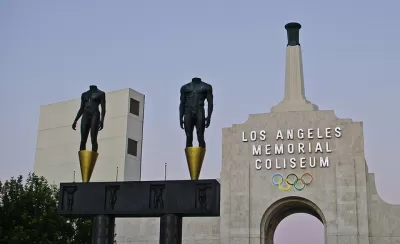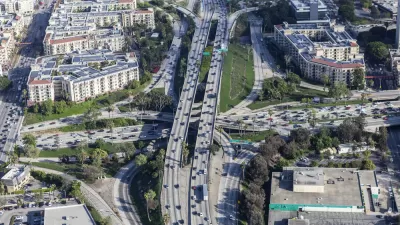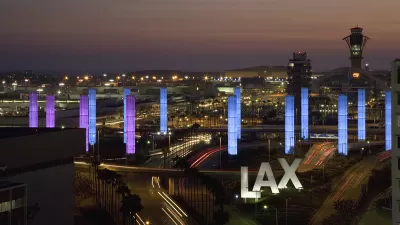Ahead of the 2028 Olympic Games, Los Angeles is rallying around infrastructure buildout and technological advancement.

Los Angeles could see an Olympic Games that is entirely connected by transit, organizers say. At the VerdeXchange 2018 Conference in Downtown L.A., AECOM sports leader Bill Hanway announced, "In our plan, each sports park is entirely accessible by public transport. No private cars will be used at all during the course of the Games."
That vision is driven in large part by LA Metro's plan to accelerate 28 projects for the Olympics, which CEO Phil Washington told the conference is the most ambitious transportation infrastructure initiative in the country. Metro is also in talks with Elon Musk about using his tunnel-boring technology to speed up projects, Washington said.
L.A. hopes that using the Olympics as a stimulus to strengthen existing infrastructure could drive important advancements for the region, unlike in other cities where hosting ended in empty husks and copious debt. Sharing lessons from past games, the panel noted that L.A.'s last go-around, in 1984, prompted the launch of the country's first program to synchronize traffic signals.
But since the city is now in the unusual position of preparing for the games 11 years ahead of time, it must allow for the near certainty that new technologies—especially transportation technologies—will push the limits of what current infrastructure plans can deliver or even imagine.
Justin Erbacci, chief innovation officer at LAX, told the panel that the airport is planning to have not only autonomous cars, but also flying cars (a.k.a. vertical take-off and landing vehicles) in service by the 2028 Olympics. That's on top of the modernization program the airport is already undertaking, which includes an automated people mover that will connect it to Metro rail for the first time.
Read the full discussion in The Planning Report, or watch it on video.
FULL STORY: LA's 2028 Olympics Already Catalyzing Transformative Infrastructure Investments

Planetizen Federal Action Tracker
A weekly monitor of how Trump’s orders and actions are impacting planners and planning in America.

Congressman Proposes Bill to Rename DC Metro “Trump Train”
The Make Autorail Great Again Act would withhold federal funding to the system until the Washington Metropolitan Area Transit Authority (WMATA), rebrands as the Washington Metropolitan Authority for Greater Access (WMAGA).

DARTSpace Platform Streamlines Dallas TOD Application Process
The Dallas transit agency hopes a shorter permitting timeline will boost transit-oriented development around rail stations.

Supreme Court Landlord Appeal Case Could Overturn Tenant Protections
A legal case claiming that COVID-era eviction moratoriums were unconstitutional could spell trouble for tenant protections.

Texas Moves to Curb Orphan Wells, But Critics Say Loopholes Remain
A proposed state law would shift financial responsibility for sealing unused drilling sites from the public to energy operators, though some advocates question its effectiveness due to industry-backed exemptions.

Affordable Housing Finance 101
The financial intricacies involved in building affordable housing can be difficult to understand. This explainer breaks down the foundational concepts.
Urban Design for Planners 1: Software Tools
This six-course series explores essential urban design concepts using open source software and equips planners with the tools they need to participate fully in the urban design process.
Planning for Universal Design
Learn the tools for implementing Universal Design in planning regulations.
Municipality of Princeton
Roanoke Valley-Alleghany Regional Commission
City of Mt Shasta
City of Camden Redevelopment Agency
City of Astoria
Transportation Research & Education Center (TREC) at Portland State University
US High Speed Rail Association
City of Camden Redevelopment Agency
Municipality of Princeton (NJ)





























